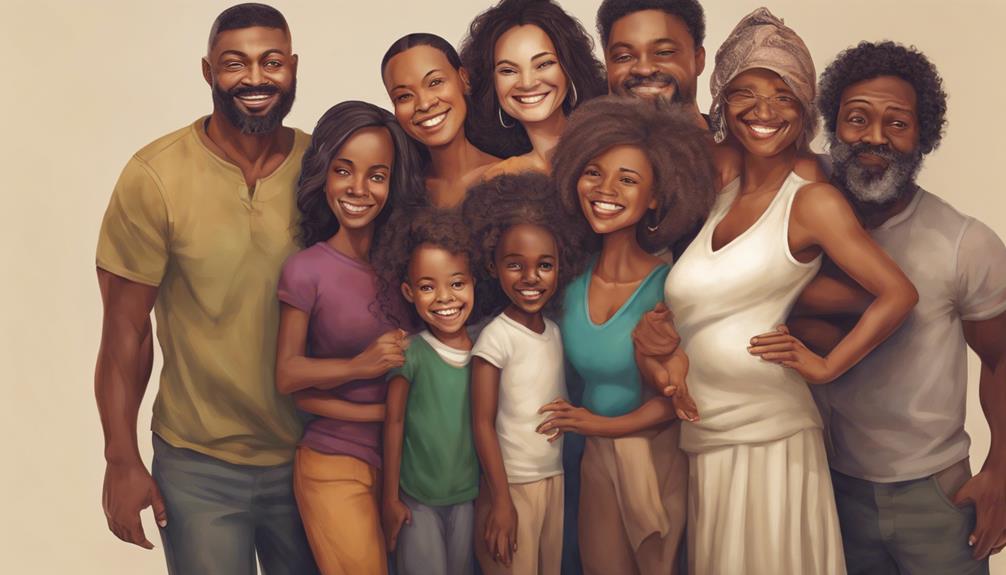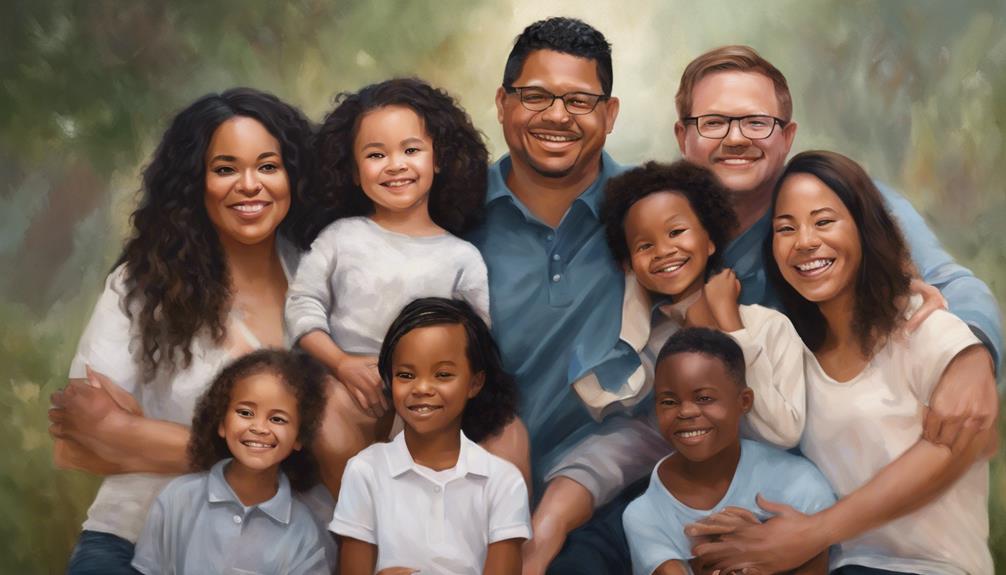In the realm of relationships, it is commonly acknowledged that appearances can be deceiving, a sentiment that holds true when comparing childless and childfree couples. Delving into the nuances of these differences can provide valuable perspectives on the various reasons and experiences that influence people’s choices about having children.
By peeling back the layers of societal expectations and personal choices within these two paths, we can gain a deeper appreciation for the complexities that influence couples' family planning journeys and the impact these decisions have on their lives and relationships.
Key Takeaways
- Childless couples desire children but face challenges, while childfree couples intentionally choose not to have children.
- Societal perceptions and cultural expectations influence how childless and childfree couples are viewed and treated.
- Emotional impacts differ, with childless couples experiencing loss and grief, while childfree couples face societal judgment and pressure.
- Lifestyle benefits for childfree couples include freedom, quality time, personal growth, and strengthened relationship dynamics.
Origins of Childless and Childfree Terms
The distinction between the terms 'childless' and 'childfree' originated from a need to differentiate between individuals who lack children but desire them and those who intentionally choose not to have children. As childfree individuals, we embrace the deliberate decision to not have children, a choice that reflects our desires and intentions regarding parenthood. This distinction is crucial as it recognizes and validates our autonomy in defining our paths to fulfillment.
Being childfree means celebrating the freedom to shape our lives according to our aspirations and priorities, unbound by traditional expectations. We navigate our journey without the constraints of parenthood, allowing us to explore diverse opportunities and experiences that enrich our lives in unique ways. Embracing the term 'childfree' empowers us to embrace our decision confidently, fostering a deep sense of self-awareness and contentment in our chosen lifestyle.
Understanding the origins and meanings of the terms 'childless' and 'childfree' is essential for honoring the diverse experiences and choices individuals make regarding parenthood. As childfree individuals, we embody a narrative of intentional living, shaping our identities authentically and purposefully.
Societal Perceptions and Stereotypes

We face societal pressures and stereotypes that shape how childless and childfree couples are perceived. These expectations often come from cultural norms that dictate parenthood as a key aspect of a fulfilling life.
The misconceptions and judgments surrounding our choices can influence our relationships and well-being.
Stereotypes in Society
Societal perceptions often shape the way childless and childfree couples are viewed, influencing attitudes and behaviors towards them. Here are four key points to consider:
- Women who are childless may be stigmatized, facing assumptions that their role in society is incomplete without motherhood.
- Childfree couples can be unfairly judged as selfish or immature for choosing not to have children.
- These stereotypes can lead to misunderstanding and societal pressure on both childless and childfree couples.
- Gender roles, family expectations, and the purpose of relationships all play a role in perpetuating these harmful stereotypes.
Cultural Expectations and Norms
Cultural norms often dictate expectations around parenthood, shaping perceptions of couples who are childless or childfree. In many societies, the term childless can carry negative connotations, with assumptions of infertility, selfishness, or unfulfillment. On the other hand, childfree couples may face judgment for not adhering to traditional norms of starting a family. These stereotypes and societal pressures can influence how childless and childfree couples are viewed and treated within their communities. Misconceptions about their choices often lead to feelings of isolation or exclusion, further perpetuating the stigma surrounding couples who do not have children. Breaking free from these cultural expectations is essential for creating a more inclusive and understanding environment for all types of families.
| Stereotypes | Childless Couples | Childfree Couples |
|---|---|---|
| Assumptions | Infertility | Selfishness |
| Perceptions | Lack of Fulfillment | Nonconformity |
| Impact | Judgment | Stigma |
Emotional Impact on Couples
Experiencing a range of emotions, both childless and childfree couples navigate unique paths that shape their relationships and personal well-being. Here are four key emotional impacts on couples:
- Feelings of Loss and Grief: Women without children in childless couples may experience profound sadness and grief due to the inability to conceive or carry a child, impacting their emotional well-being and the dynamics of the relationship.
- Societal Judgment and Pressure: Childfree couples often face societal pressures and judgments for their decision not to have children, causing emotional strain and affecting their sense of fulfillment and happiness.
- Challenges of Infertility and Medical Treatments: Childless couples may undergo emotional turmoil while dealing with infertility issues, medical treatments, and the uncertainty of their family-building journey, which can strain their relationship.
- Freedom and Focus: On the other hand, childfree couples enjoy the freedom to prioritize their relationship, careers, and personal pursuits without the responsibilities of parenting, leading to a deeper connection and sense of fulfillment within the partnership.
Decision-Making Factors

Navigating the decision-making process between childless and childfree couples involves considering various factors that shape their choice regarding parenthood. For a woman without children, these factors can be deeply personal and impactful. Childless couples may grapple with emotional struggles related to infertility or medical issues, in addition to societal pressures and financial constraints associated with fertility treatments. These challenges can weigh heavily on their decision-making process, influencing their path towards parenthood.
On the other hand, childfree couples make a conscious choice to not have children, driven by personal values, beliefs, and desires for a different life trajectory. Factors such as personal freedom, career aspirations, and lifestyle preferences play a significant role in their decision-making. By prioritizing their own goals and aspirations above traditional expectations of starting a family, childfree couples carve out a unique path that aligns with their individual desires and beliefs. The distinction between childless and childfree couples ultimately lies in the intention behind their decision regarding parenthood.
Lifestyle Choices and Freedom

We actively choose our path, valuing our independence and autonomy above all else. Our lifestyle decisions play a crucial role in shaping our relationships and defining our sense of fulfillment.
Parenthood is a personal choice that we've made with careful consideration of our desires and aspirations.
Parenthood as Personal Choice
How does the decision to embrace or forgo parenthood reflect lifestyle choices and personal freedom for couples?
When considering parenthood, each couple's journey is deeply intertwined with their individual desires and aspirations. For childfree couples, the decision to not have children enables a lifestyle focused on personal growth and shared experiences.
Conversely, childless couples, especially women without children, may face emotional turmoil due to infertility, navigating societal expectations and personal grief. Parenthood as a personal choice illuminates the following:
- Prioritizing individual goals and interests.
- Navigating societal pressures and expectations.
- Cultivating financial advantages and flexibility.
- Building strong emotional bonds and relationships sans parental responsibilities.
Embracing Independence and Autonomy
Embracing independence and autonomy, childfree couples consciously prioritize their lifestyles and freedom by choosing not to have children. This decision allows us to nurture our individuality and focus on personal growth without the responsibilities of parenthood.
As a woman without children, I revel in the freedom to make spontaneous decisions, pursue my passions, and prioritize self-care. Our relationships thrive on mutual respect for each other's autonomy, fostering a deep sense of understanding and support.
Without the constraints of raising children, we've the flexibility to travel, advance our careers, and indulge in leisure activities on our terms. Choosing to be childfree empowers us to craft a life that honors our values and grants us the liberty to explore diverse experiences together.
Impact on Relationships
With the decision to be childfree, couples often experience a significant increase in lifestyle choices and freedom. Here are four ways this decision can impact relationships:
- Enhanced Quality Time: Childfree couples have more opportunities to spend quality time together without the demands of parenting responsibilities.
- Financial Stability: Being childfree can reduce financial stress, allowing couples to focus on strengthening their bond and shared goals.
- Personal Growth: Without the obligations of raising children, couples can focus on personal growth, pursuing individual interests and hobbies.
- Stronger Relationship Dynamics: Choosing to be childfree can lead to a more intentional and focused approach to relationship building, fostering deeper connections and shared fulfillment.
Support Systems and Communities

Childfree couples actively seek out support systems and communities that align with their values and lifestyles. These networks provide a sense of belonging and understanding, offering a safe space to discuss shared experiences and challenges. Online forums and social media groups play a crucial role in connecting childfree couples worldwide, fostering a sense of community and providing valuable support. Additionally, local meet-up groups in some cities offer opportunities for childfree couples to socialize in person, building strong networks and friendships.
| Support Systems and Communities | Description | Benefits |
|---|---|---|
| Online Forums and Social Media | Virtual spaces for childfree couples to connect, share experiences, and offer support. | Global reach, diverse perspectives, 24/7 availability |
| Local Meet-up Groups | In-person gatherings for childfree couples to socialize and build networks in their communities | Face-to-face interactions, fostering deeper connections |
| Resources, Events, and Discussions | Offered by childfree communities to help navigate societal pressures and unique lifestyle challenges | Guidance, solidarity, personal growth opportunities |
Support systems and communities tailored to childfree couples focus on nurturing positive relationships, personal growth, and mutual understanding, enabling individuals to thrive in their chosen lifestyle.
Relationship Dynamics and Communication

We'll explore how trust plays a crucial role in relationships, shaping the foundation for open communication styles and effective conflict resolution strategies.
These aspects are vital in fostering healthy dynamics and strengthening the bond between partners, whether they're childless or childfree.
Trust in Relationships
In childfree relationships, trust thrives on open communication, mutual respect, and shared values. Trust is the cornerstone of our connection, fostering a deep bond that sustains us through life's ups and downs. Here are four essential elements that strengthen the trust in our relationship:
- Honesty: We believe in being transparent and truthful with each other, creating a safe space for vulnerability.
- Empathy: Understanding and empathizing with each other's perspectives helps us navigate challenges with compassion.
- Validation: Acknowledging and respecting each other's feelings and choices reinforces our trust and mutual understanding.
- Active Listening: Engaging in attentive listening ensures that we truly hear and comprehend each other, fostering a deeper connection based on trust.
Open Communication Styles
Trust in relationships sets the foundation for open communication styles, shaping the dynamics and interactions between childless and childfree couples. In childfree relationships, honest discussions about shared values and goals regarding parenthood create a space for understanding and alignment. On the other hand, childless couples may navigate emotional conversations surrounding infertility or family-building challenges through supportive communication. These communication dynamics play a crucial role in how decisions are made and how the relationship evolves. By fostering effective communication practices, childless and childfree couples can build strong emotional bonds and maintain mutual understanding.
| Childless Couples | Childfree Couples |
|---|---|
| Navigate infertility or family-building challenges | Engage in honest discussions about shared values and parenthood goals |
| Supportive communication during emotional conversations | Foster understanding and alignment in decision-making processes |
| Shape relationship dynamics through open communication | Build strong emotional bonds and maintain mutual understanding |
Conflict Resolution Strategies
Navigating conflicts through effective communication and understanding is essential in maintaining the relationship dynamics of childless and childfree couples. When it comes to conflict resolution strategies, we've found that:
- Active Listening: Engaging in active listening can help partners feel heard and valued.
- Empathy Building: Developing empathy towards each other's perspectives fosters mutual understanding.
- Respectful Communication: Maintaining respect during disagreements can prevent escalation and promote healthy resolutions.
- Goal Alignment Discussions: Having open discussions about desires and goals can lead to finding common ground and resolving conflicts effectively.
Career and Personal Fulfillment

Embracing a childfree lifestyle allows us to focus on our career advancement and personal fulfillment without the responsibilities of raising children. This decision grants us the freedom to pursue our professional goals and personal interests without the constraints of parenthood.
With more time, resources, and flexibility at our disposal, we can wholeheartedly devote ourselves to our individual aspirations and passions. By choosing to remain childfree, we intentionally design a lifestyle that aligns perfectly with our ambitions and desires. This deliberate choice empowers us to create a unique work-life balance that suits our specific preferences and priorities.
Without the demands of parenting, we can fully immerse ourselves in our careers and personal growth, nurturing our talents and exploring new opportunities. Our childfree status enables us to curate a fulfilling life that revolves around our personal development and professional success.
Self-Identity and Definition of Family

As we shift our focus to 'Self-Identity and Definition of Family', the distinction between childless and childfree couples becomes apparent in how they each shape their sense of self and family structure.
- Embracing Personal Choice: Childfree couples define their family based on personal values, embracing the freedom and flexibility that comes with not having children.
- Centering Self-Identity: Self-identity for childfree couples often revolves around their intentional decision to forgo having children, finding fulfillment in alternative paths within their relationship.
- Prioritizing Autonomy: Childfree couples prioritize personal goals and lifestyle choices, shaping their family structure around their own desires rather than societal expectations.
- Respecting Diverse Paths: Understanding that both childless and childfree couples have unique journeys, it's essential to respect and acknowledge the different ways in which they define family and self-identity.
In exploring self-identity and the definition of family, it becomes evident that these aspects are deeply intertwined with the choices made by childfree couples, highlighting the diversity and richness of familial structures in today's society.
Future Trends and Acceptance

The societal landscape is witnessing a shift towards greater acceptance and evolving trends in family structures and reproductive choices. Birth rates are declining in various countries, reflecting a changing perspective on parenthood.
Advocacy for reproductive rights and fertility treatments is on the rise, indicating a growing acceptance of diverse family arrangements. This shift is particularly significant for childless women, who are often subject to societal pressures and stigma. However, increasing awareness and education about infertility are fostering empathy and understanding towards individuals dealing with childlessness.
Modern societies are reevaluating traditional views on parenthood and family, emphasizing individual choice and autonomy. These cultural shifts are challenging the stigma associated with not having children and highlighting the importance of respecting different reproductive choices. As attitudes continue to evolve, there's a promising trend towards a more inclusive and accepting society for all individuals, including those who are childless.
Frequently Asked Questions
What Is the Difference Between Childless and Child Free Couples?
We believe the difference between childless and childfree couples lies in their desires and choices regarding parenthood. Childless couples long for children but face obstacles, while childfree couples actively choose not to have children for personal reasons.
The distinction reflects the varied paths couples take in building their families.
Are Childless and Childfree Families the Same?
We're like different flavors of ice cream; childless and childfree families aren't the same. Childless families long for children but face obstacles, while childfree families choose a life without kids. Our experiences and desires vary, shaping our unique paths.
Respecting these differences allows us to appreciate the diverse ways individuals navigate parenthood. Understanding these distinctions fosters empathy and inclusivity towards all family choices.
Let's celebrate the beautiful diversity among families!
What Are the Disadvantages of Childless Couples?
Sure, the disadvantages of childless couples include societal pressure, emotional challenges like feelings of inadequacy, difficulties in social settings centered around children, concerns about future care in old age, potential isolation from parenting-focused social circles, and feelings of exclusion.
These factors can contribute to a sense of loss, inadequacy, and isolation for childless couples, impacting their social interactions and well-being.
What Do Childless Couples Do With Their Time?
We fill our days with pursuits that bring us joy. Traveling, pursuing hobbies, and enjoying leisure activities are common pastimes.
We prioritize personal and professional growth, whether through career advancement, education, or entrepreneurial endeavors.
Spontaneous outings, social gatherings, and last-minute adventures keep life exciting.
Self-care, fitness routines, and nurturing relationships with loved ones are also important to us.
Our time is ours to savor and make the most of.
Can Childfree Couples Still Have a Family Through Adoption?
Yes, adopting while remaining childfree is a beautiful option for couples who want to experience the joys of parenthood without biological children. Adopting a child can provide the opportunity to build a family and create a meaningful and loving home, even without having biological kids.
Conclusion
In conclusion, embracing the diverse paths of childless and childfree couples opens the door to a more compassionate and understanding society. By acknowledging the nuanced choices and experiences of these individuals, we can break down barriers and foster empathy.
Let's celebrate the beauty of choice and respect the journey of all couples, whether they've children or not. Together, we can create a more inclusive and accepting world for everyone.
Augustus is the visionary leader and Editor-in-Chief of Personality-Test.net. With an unwavering commitment to quality and authenticity, he oversees all content, ensuring it enlightens and empowers our audience. Augustus believes deeply in the transformative power of self-awareness and is dedicated to making Personality-Test.net a beacon for those on a journey to understand themselves better.










